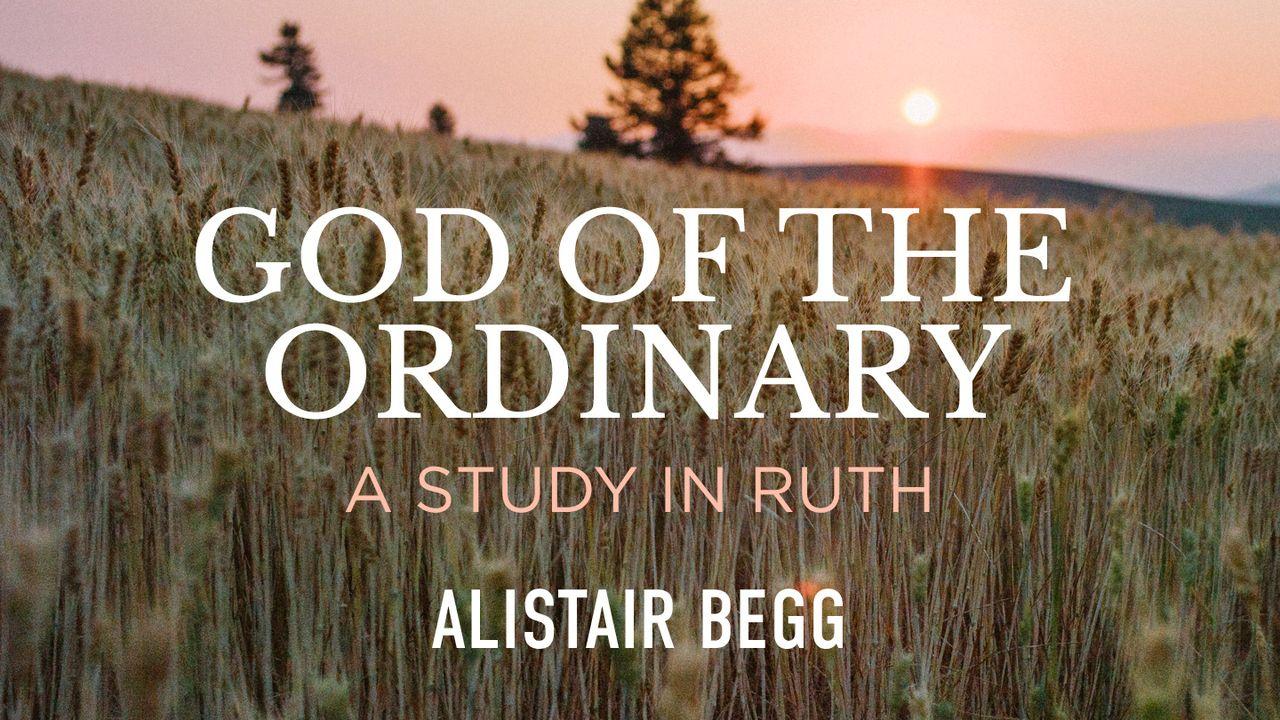God of the Ordinary: A Study in RuthSample

THE COMFORT OF GOD’S PROVIDENCE
“Then Naomi … said to her, ‘My daughter, should I not seek rest for you, that it may be well with you? Is not Boaz our relative, with whose young women you were? See, he is winnowing barley tonight at the threshing floor. Wash therefore and anoint yourself, and put on your cloak and go down to the threshing floor.’” RUTH 3:1-3 (ESV)
God is sovereign, and therefore we can make bold choices.
As any nurturing figure would do, Naomi wanted her widowed daughter-in-law Ruth to be settled and cared for in life. So she urged Ruth to go to Boaz and ask him to assume the role of provider by marrying her.
Of course, we must be careful not to read too much into this Old Testament story since that era had its own set of customs. However, we must also remember that these were real people in a real Middle-Eastern village meeting a real God and committing their lives unreservedly to Him. As such, there are eternal truths to be learned. Primarily, we can learn that while God’s providence rules over our lives, it does not limit our freedom in making decisions. God’s overruling sovereignty did not hinder Naomi’s reasoning or Ruth’s response. The Lord was sovereign over all of it, but not at the expense of their choices.
Ruth’s story is also a reminder that even when mistakes alter our lives, God redeems them for our good and His glory. Naomi’s husband should not have moved his family from the promised land to Moab, the enemies of God’s people, and her sons should not have married Moabite women since God’s law prohibited marrying into other religions. Yet these wrong choices brought Ruth to Naomi, to God, and into the line of redemptive history as an ancestor of Jesus (Matthew 1:1-6). Such redemption is not an excuse for intentional rebellion, but it is an assurance that we need not despair over past mistakes.
Equally, God’s sovereignty in weaving His plan of redemption, first in bringing His Son into the world and then in calling His people to faith in Him, is a constant assurance as we face decisions and consider this or that course of action. We trust God through faith-filled action. Naomi didn’t just sit in her house waiting on God to act, saying, Whatever God wills will be. No, she took action by encouraging Ruth to take the next step in what seemed to be unfolding.
Trusting God’s providence does not mean we sit back and wait for the plan to unfold, singing Que será, será—whatever will be, will be—for “the future’s not ours to see.”[1] Instead, we should be quoting Jesus’ words: “Not my will, but yours, be done” (Luke 22:42). After Jesus prayed this prayer, He proceeded to live it out in perfect obedience, even to the point of death. The path of life may have many twists and turns, but God’s word promises that “for those who love God all things work together for good, for those who are called according to his purpose” (Romans 8:28). Take heart in this promise. Are you facing a decision? Are you wondering what path to take? God is sovereign, and God saves. Whatever you decide, live boldly and live freely within the comfort of God’s providence.
- How is God calling me to think differently?
- How is God reordering my heart’s affections—what I love?
- What is God calling me to do as I go about my day today?
Further Reading: ACTS 16:6-15
[1] Ray Evans, “Que Será, Será” (1956).
Scripture
About this Plan

Ruth must surely be one of the loveliest stories ever written, telling an unforgettable tale of purity, faithfulness, innocence, loyalty, duty, and love. We read of ordinary people in Bethlehem facing everyday events, from loss and dislocation to marriage and family life. In all of this, however, Alistair Begg reminds us that no matter how dark our days may seem, God still protects His people and accomplishes His purposes.
More
| We would like to thank Truth For Life for providing this plan. For more information, please visit: http://tfl.org/365 |
Related Plans

REDEEM: A Journey of Healing Through Divorce and Addiction

Connect With God Through Remembrance | 7-Day Devotional

Extraordinary Christmas: 25-Day Advent Devotional

Bible in a Year Through Song

Spirit + Bride

Heart Over Hype: Returning to Authentic Faith

Romans: Faith That Changes Everything

God's Purposes in Motherhood

Small Wonder: A Christmas Devotional Journey
